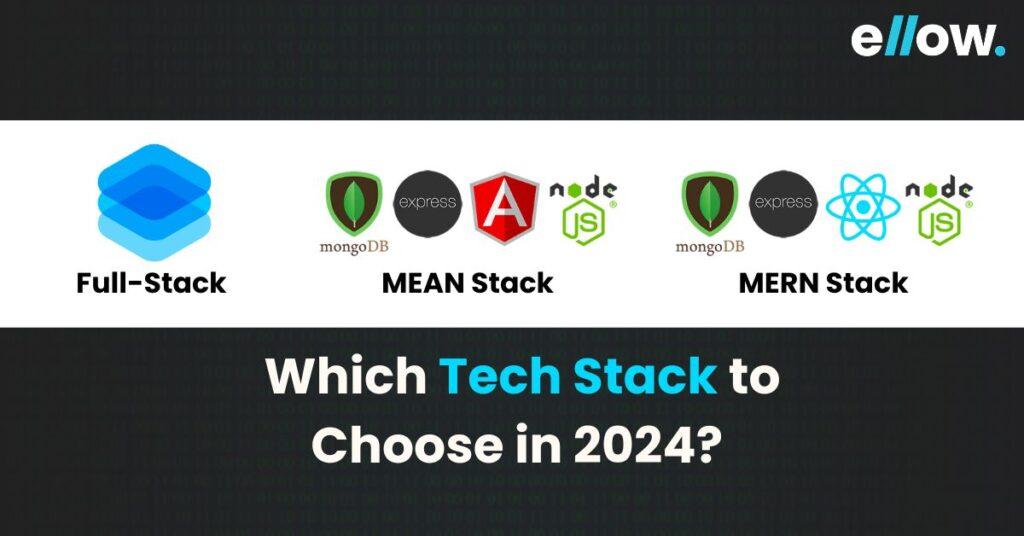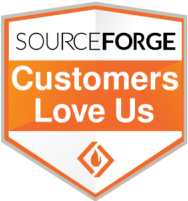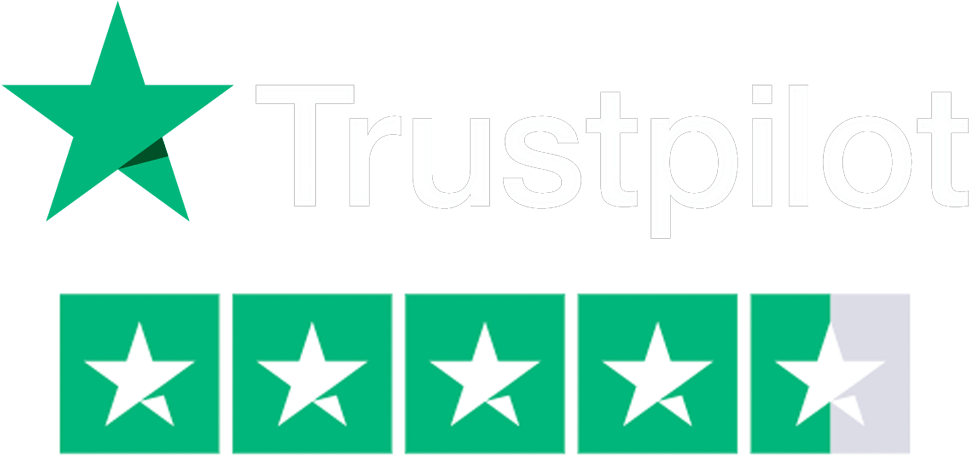As we step into 2024, the debate over Full-Stack, MEAN Stack, and MERN Stack continues to spark curiosity among developers and businesses alike. Each stack brings its unique set of features, libraries, and frameworks to the table, offering distinct advantages.
Full-Stack, with its comprehensive approach, covers both front and back-end development, providing a versatile skill set.
According to Statista, Global recruiters have identified back-end and full-stack developers as the most sought-after IT roles in 2023.
Meanwhile, MEAN Stack (MongoDB, Express.js, Angular, Node.js) and MERN Stack (MongoDB, Express.js, React, Node.js) focus on JavaScript-based technologies, streamlining the development process.
In this article, we delve into the distinctive features of Full-Stack, MEAN Stack, and MERN Stack, guiding both seasoned developers and tech enthusiasts through a comprehensive exploration. Together, let us unravel the unique attributes of these stacks and uncover the perfect technology stack poised to elevate your projects in 2024.
What do you mean by Stack?
A “stack” in the context of technology refers to a combination of programming languages, development tools, frameworks, and libraries that developers use to create web applications. It is like a toolbox containing everything needed to build and run a specific type of software.
There are two main types of stacks: application stacks and technology stacks, each serving its purpose in developing various web and mobile applications. Developers select the best combination of tools from the stack to maximize the efficiency and performance of their applications.
How to choose the right Stack?
Choosing the right stack for your project is important for its success. Before you make a decision, consider evaluating the below factors:
- Project Requirements: Understand the specific needs of your project. What technologies and features are essential for its success?
- Agility: Determine if you prioritize speed and flexibility in development. Some stacks offer rapid development, while others may be more structured.
- Customer Reach: Consider whether you want to go beyond basic project requirements to attract a larger audience. Some stacks are better suited for scalability and reaching a broader user base.
- Team Expertise: Assess the knowledge and expertise of your team or organization. Choosing a stack familiar to your developers can enhance efficiency and reduce the learning curve.
- Scalability and Flexibility: Find out about the scalability of your application based on project demands. A stack that offers flexibility in adapting to the evolving needs of your application can prove advantageous. Consider whether your chosen technology stack facilitates seamless adjustments to match the dynamic requirements of your project. .
- Cost of Development: Calculate the overall cost of development, including licensing fees, infrastructure, and maintenance. Opt for a stack that aligns with your budget while meeting project requirements.
Let’s delve a little more deeply into each one of them.
Full-Stack Development
Full-stack development refers to a comprehensive approach where developers handle both the front and back end of the website and application. It involves blending programming languages, tools, and technologies to create fully functional digital solutions.
Full-Stack development is a preferred choice for mid-size enterprises and startups, seeking a holistic approach that balances efficiency, versatility, and cost-effectiveness in the development of websites and applications.
Benefits of Full-Stack Development
- Efficient Team Management:
Reduces the need for hiring specialized developers and streamlining team management. Fewer developers can efficiently handle both frontend and backend tasks, simplifying project coordination.
- Adaptability and Easy Switching:
Full-stack developers are adaptable, enabling smooth transitions between technologies. A/B testing methodology is employed to ensure optimal results while experimenting with different technologies.
- Versatility in Technologies:
Full stack developers have skills in a range of technologies, including CSS, HTML5, TypeScript, React, and Angular for the front end, as well as Python, Django, Middleware, PHP, and NodeJs for the back-end. They’re also experienced in database management and can craft applications for different mobile platforms.
- Quick Deployment:
Accelerated application development allows for quicker deployment to the market. Well-suited for enterprises aiming for speedy market entry and startups with time-sensitive projects.
- Control Over Project Infrastructure:
Full-stack developers easily manage project design structures and can make necessary changes during development. Offers flexibility in adapting to evolving project requirements and ensures efficient infrastructure control.
- Cost-Effective Hiring:
Hiring a full-stack developer can be more cost-effective than hiring separate front-end and back-end developers. One developer with expertise in both reduces overall project costs without compromising quality.
- Simplified Upgradation:
Upgrading is made easy with modern tools and technologies, allowing for smooth transitions between tasks based on project requirements. This flexibility enhances the overall efficiency of the development process.
MEAN Stack Development
MEAN Stack, a powerful combination of JavaScript-based technologies, is employed for crafting sophisticated websites and web applications. Comprising MongoDB, Express.js, Angular, and Node.js, MEAN Stack helps in expediting and automating the development process. MongoDB stores data in a scalable, schema-less format (BSON) suitable for unstructured or semi-structured data.
Express.js has a Backend web application framework for Node.js, streamlining server-side development with features like routing and middleware. Angular has a Front-end framework facilitating dynamic, single-page web applications with a Model-View-Controller (MVC) architecture and real-time data binding.
Node.js has a JavaScript runtime environment executing server-side code, enabling scalable and high-performance web applications with an event-driven, non-blocking I/O model.
Benefits of MEAN Stack
- Versatile Development:
MEAN Stack developers exhibit adaptability, seamlessly transitioning between server- and client-side activities, enhancing the overall development speed.
- Similar Coding:
Utilizing MEAN Stack’s code-sharing feature, developers can avoid the creation of separate codes for iOS and Android. This similarity in coding not only saves time but also reduces development costs.
- Faster Development Speed:
MEAN Stack empowers developers to swiftly create Minimum Viable Products (MVPs) of applications. This acceleration in development speed is crucial for staying competitive in today’s dynamic tech landscape.
- Scalable Testing:
Testing MEAN Stack apps is simplified, with developers leveraging cloud-based solutions for development and testing. This scalability ensures a robust and reliable solution, meeting the demands of modern applications.
- Organized Development:
MEAN Stack development eliminates the need for unnecessary tasks, promoting an organized approach to web application development. This streamlined process enhances efficiency and reduces development complexities.
- Comprehensive Testing Suite:
As an open-source framework, MEAN Stack has a comprehensive testing suite. This built-in suite ensures thorough testing and quality assurance, contributing to the robustness of the developed applications.
- Community Support:
MEAN Stack enjoys widespread popularity, fostering a vibrant and supportive community. The open-source nature of the framework encourages collaboration and knowledge-sharing among developers, providing a valuable resource for troubleshooting and innovation.
- Model View Controller (MVC) Architecture:
MEAN Stack adheres to the Model View Controller (MVC) architecture, promoting a seamless and organized development process. This architectural approach enhances code maintainability and facilitates teamwork in large-scale projects.
MERN Stack Development
MERN Stack, an acronym for MongoDB, Express.js, React, and Node.js, is a popular JavaScript stack widely employed in the development of high-end web applications. This combination of open-source technologies offers a seamless and comprehensive framework for developers.
According to Browser Stack, React has witnessed a surge in popularity, surpassing Angular in developer preference. This rise in React’s popularity has made it slightly more prevalent than Angular. As a result, hiring React developers for web app development has become relatively easier due to the larger talent pool associated with the framework.
Benefits of MERN Stack
- MongoDB Benefits:
MongoDB, an open-source database, facilitates easy data storage in adaptable JSON file formats. Integration with file storage representing JSON is simplified, providing developers with a user-friendly experience.
- Dynamic Schema:
MERN technologies offer a configurable data model with a dynamic schema. Developers leverage these features to swiftly create applications with enhanced flexibility and adaptability.
- End-to-End Development:
MERN Stack supports full-stack development, empowering developers with all necessary resources, including the latest front-end tools and technologies. This comprehensive environment streamlines the development process, allowing for the creation of fully scalable apps.
- Flexible and Scalable:
The MERN Stack enhances the scalability of solutions, adding significant value to the development process. The stack’s flexibility is seen by its ability to maintain standardization among cloud services, ensuring robust and adaptable solutions.
- JavaScript Throughout
MERN Stack covers the entire web development lifecycle, seamlessly integrating JavaScript from the front end to the back end. This results in a smooth development process that supports the Model-View-Controller (MVC) architecture.
- Ideal for JavaScript Experts:
Experienced developers in JSON and JavaScript can maximize the potential of MERN Stack development due to its JavaScript backbone. This makes the stack particularly well-suited for those already skilled in JavaScript and JSON.
- Built-In Testing Tools:
MERN Stack provides a variety of built-in testing tools, simplifying the testing process for developers. These tools contribute to the overall reliability and quality assurance of MERN-based applications.
- Open-Source Community Support:
As an open-source framework, MERN Stack benefits from the support of a thriving local community of developers. This collaborative environment fosters continuous improvement, innovation, and the sharing of knowledge among developers.
Factors Affecting Your Decision
When comparing MEAN (MongoDB, Express.js, Angular, Node.js) versus MERN (MongoDB, Express.js, React, Node.js), a key distinction lies in the use of Angular in MEAN and React in MERN.
Here are some factors to consider
- Enterprise-Level Projects:
For large-scale enterprise projects requiring a robust architecture, a MEAN stack is often preferred. It supports the Model-View-Controller (MVC) architecture, providing an organized framework. The ease of handling coding and upgrading existing solutions is a notable advantage in MEAN stack.
- Third-party Support:
MEAN utilizes Angular, which inherently supports HTTP calls and backend connections. React, used in MERN, relies on its libraries for similar functionalities. MEAN automatically manages third-party extensions, while MERN may require additional setup for handling them.
- Niche Projects:
If you are working on niche projects or smaller-scale applications, MERN offers a compelling choice. MERN’s React component facilitates an excellent user experience and simplifies the management of abrupt data changes. It is particularly well-suited for projects like single-page applications or mobile apps.
Check this video out: MEAN vs MERN | MEAN Stack vs MERN Stack | Which one to Choose? | Full Stack Training | Edureka
Head-to-Head Comparison: Full Stack vs MERN Stack vs MEAN Stack
This table provides a head-to-head comparison of Full Stack, MEAN Stack, and MERN Stack based on key factors such as scalability, architecture, productivity, third-party support, features, and security. It can assist developers and decision-makers in choosing the most suitable stack for their specific project requirements.
| Factors | Full Stack | MEAN Stack | MERN Stack |
| Scalability | Medium scope for application scalability | Medium scope for application scalability | Huge scope for application scalability |
| Architecture | 3-tier web architecture | The architecture supports code upgrades and management | Architecture for smooth UI rendering |
| Productivity | Better productivity | Better productivity | Lower productivity |
| Third-party Support | Support for third-party libraries like jQuery, LESS, etc. | Ready-to-use tools in the stack | Various third-party libraries for enhanced functionality |
| Features | High-level features can be added to the application | Enough features can be added to the application | High-level features can be added to the application |
| Security | Medium security for the final solution | High security for the application | Medium security for mobile applications |
Which Stack Should You Choose for Your Next Project?
Choosing the right stack for your project depends on various factors. Full-stack development offers versatility and scalability, making it ideal for feature-rich applications. If you aim to enhance an existing app with the latest libraries, consider hiring MEAN Stack developers.
Meanwhile, Mern stack developers are suitable for integrating third-party libraries, ensuring a seamless UI experience. Assess your project requirements and desired features to make an informed decision. Whether it is full stack, Mean stack, or Mern stack, each has its unique benefits.
Recommended Reads
5 Best Full Stack Project Ideas in 2024
FAQs
- What factors should I consider when choosing a technology stack for my project in 2024?
Consider project requirements, scalability needs, and desired features to align with the capabilities of Full-Stack, MEAN Stack, or MERN Stack.
- Why opt for a Full-Stack development approach in 2024?
Full-Stack offers versatility and scalability, making it an ideal choice for projects requiring comprehensive functionality and easy scalability.
- When is MEAN Stack the right choice for my development project?
Choose MEAN Stack if you aim to enhance an existing application by incorporating the latest libraries and technologies for improved performance.
- What advantages do MERN Stack developers bring to application integration?
MERN Stack developers excel in seamlessly integrating third-party libraries, ensuring a smooth and efficient user interface rendering.
- How do I align my project goals with the best technology stack in 2024?
Evaluate your project needs, scalability requirements, and desired features to make an informed decision between Full-Stack, MEAN Stack, and MERN Stack options.









